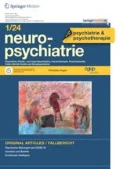Zusammenfassung
Anliegen
Ziel dieser Arbeit ist es, verschiedene Dimensionen von Religiosität und Spiritualität bei stationären psychiatrischen PatientInnen zu untersuchen. Gibt es Unterschiede im religiös/spirituellen Befinden zwischen suchtkranken (ICD-10: F1x) und ängstlich/depressiven (ICD-10: F3x/F4x) PatientInnen? Welche Implikationen ergeben sich daraus für die Behandlung?
Methode
Es werden suchtkranke PatientInnen (n = 389), ängstlich/depressive PatientInnen (n = 200) und eine gesunde Vergleichsgruppe (n = 1500) mithilfe des Multidimensionalen Inventars zum Religiös/Spirituellen Befinden (MI-RSB) miteinander verglichen. Des Weiteren wird RSB innerhalb der psychiatrischen Gruppen zu Persönlichkeitsfaktoren und psychischer Erkrankung in Beziehung gesetzt.
Ergebnisse
Die psychiatrischen Gruppen zeigen ein geringeres Ausmaß an RSB als gesunde Vergleichspersonen (p < 0,001). Des Weiteren ergeben sich negative Zusammenhänge zwischen den RSB-Dimensionen mit psychopathologischen Symptomen.
Schlussfolgerungen
Basierend auf diesen Ergebnissen kann auf die Relevanz religiös/spiritueller Inhalte für die psychiatrische Praxis geschlossen werden. Im Besonderen ist auf die mögliche therapeutische Wirksamkeit der RSB-Dimensionen „Hoffnung“ und „Vergeben“ in der Arbeit mit psychiatrischen PatientInnen zu verweisen.
Summary
Objective
The aim of this study is to investigate different dimensions of religiosity and spirituality among psychiatric in-patients. The study examines differences between addictive (ICD 10: F1x) and anxious/depressive (ICD 10: F3x/F4x) patients and considers the main implications for treatment.
Method
Differences in dimensions of religious/spiritual well-being (RSWB) between addictive (n = 389) and anxious/depressive patients (n = 200) are investigated, also by comparison to a control group (n = 1,500). Furthermore dimensions of RSWB are related to personality factors and different psychiatric parameters within the psychiatric groups.
Results
The psychiatric groups show a lower amount of overall RSWB (p < 0.001) than the healthy controls. Furthermore, dimensions of RSWB turned out to be negatively correlated with several psychiatric symptoms.
Conclusions
Based on these results we emphasize religious/spiritual issues within psychiatric treatment. Moreover, there may be a strong potential of the RSWB dimensions such as “Hope” or “Forgiveness” as positive therapeutic factors in psychiatric treatment.
Literatur
APA concise dictionary of psychology. American Psychological Association, Washington DC; 2009.
Bortz J. Statistik für Sozialwissenschaftler. Berlin: Springer; 2001.
Dein S, Cook CC, Koenig H. Religion, spirituality, and mental health: current controversies and future directions. J Nerv Ment Dis. 2012;10:852–5.
Dervic K, Oquendo MA, Grunebaum MF, Ellis S, Burke AK, Mann JJ. Religious affiliation and suicide attempt. Am J Psychiatry. 2004;161:2303–8.
Dilling H, Mombour W, Schmidt MH, Schulte-Markwort E, Herausgeber. Internationale Klassifikation psychischer Störungen: ICD 10, Kapitel VII (F): Psychische und Verhaltensstörungen. Bern: Huber; 1994.
Franke GH. Brief symptom inventory von L.R. Derogatis (Kurzversion der SCL-90-R)-Deutsche Version. Göttingen: Beltz Test GmbH; 2000.
Hautzinger M, Bailer M, Worall H, Keller F. Beck-Depressions-Inventar. Bern: Huber; 1994.
James W. Die Vielfalt religiöser Erfahrung. Olten: Walter Verlag; 1979 (Original erschienen 1902: The varieties of religious experience).
Kapfhammer HP. Pathogene Religiosität – Anmerkungen zur Psychopathologie religiös motivierter Gewalt. Psychopraxis. 2008;11:28–36.
Kendler KS, Liu XQ, Gardner CO, McCullough ME, Larson D, Prescott CA. Dimensions of religiosity and their relationship to lifetime psychiatric and substance use disorders. Am J Psychiatry. 2003;160:496–503.
Linden M. Posttraumatic embitterment disorder. Psychother Psychosom. 2003;72:195–202.
Pargament KI. The psychology of religion and spirituality? Yes and no. Int J Psychol Relig. 1999;9:3–16.
Piedmont RL. Does spirituality represent the sixth factor of personality? Spiritual transcendence and the Five-Factor Model. J Pers. 1999;67:985–1013.
Schneider B. Persönlichkeit und Belastungs- bzw. Ressourcenfaktoren. Konstanz: Universität Diplomarbeit; 1997.
Seyringer M.-E, Friedrich F, Stompe T, Frottier P, Schrank B, Frühwald S. Die „Gretchenfrage“ für die Psychiatrie Der Stellenwert von Religion und Spiritualität in der Behandlung psychisch Kranker. Neuropsychiatrie. 2007;21:239–47.
Sloan RP, Bagiella E, Powell T. Religion, spirituality, and medicine. Lancet. 1999;353:664–7.
Smith TB, McCullough ME, Poll J. Religiousness and depression: evidence for a main effect and the moderating influence of stressful life events. Psychol Bull. 2003;129:614–36.
Unterrainer HF, Fink A. Das Multidimensionale Inventar zum religiös-spirituellen Befinden (MI-RSB): Normwerte für die österreichische Allgemeinbevölkerung. Diagnostica. 2013;1:33–44.
Unterrainer HF, Huber HP, Ladenhauf KH, Wallner SJ, Liebmann PM. MI-RSB 48. Die Entwicklung eines multidimensionalen Inventars zum religiös-spirituellen Befinden. Diagnostica. 2010;2:82–93.
Unterrainer HF, Lewis AJ, Fink A. Religious/spiritual well-being, personality and mental health: a review of results and conceptual issues. J Relig Health. 2012 Sept 11. doi: 10.1007/s10943-012-9642-5.
Author information
Authors and Affiliations
Corresponding author
Rights and permissions
About this article
Cite this article
Unterrainer, HF., Schöggl, H., Lewis, A. et al. Religiös/Spirituelles Befinden bei psychisch Kranken: Ängstlich/Depressive und Suchtkranke im Vergleich zu gesunden Kontrollpersonen. Neuropsychiatr 27, 172–179 (2013). https://doi.org/10.1007/s40211-013-0075-5
Received:
Accepted:
Published:
Issue Date:
DOI: https://doi.org/10.1007/s40211-013-0075-5

